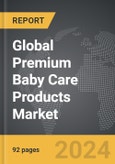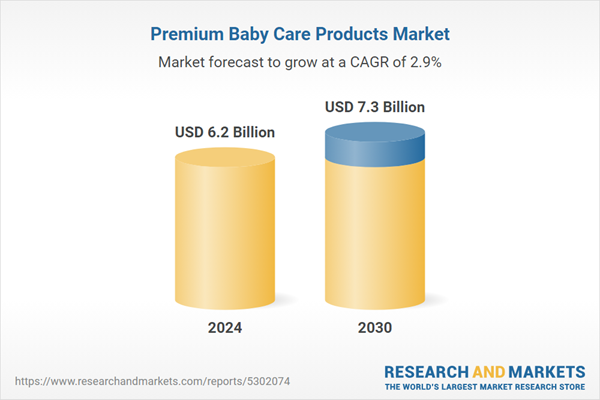Global Premium Baby Care Products Market - Key Trends and Drivers Summarized
Why Are Premium Baby Care Products Gaining Popularity?
Premium baby care products have seen a substantial surge in demand, driven by a growing number of parents who are more conscientious about the health, safety, and comfort of their babies. But why are these products so sought after? One of the primary reasons is the increasing awareness around the sensitivity of babies' skin and overall health, which has led parents to prioritize products that are free from harsh chemicals and synthetic additives. These concerns have fueled a preference for premium products, which typically offer organic, natural, and hypoallergenic alternatives to conventional options. Parents are now looking for baby care solutions that not only serve their immediate needs - such as moisturizing, cleansing, or diapering - but also provide long-term benefits by being gentle, nourishing, and environmentally friendly. The appeal of premium baby care products is also tied to the perception that they offer a higher standard of quality, often produced with greater attention to detail and tested to meet more rigorous safety standards. Additionally, as the wellness movement continues to grow, parents are adopting a more holistic approach to baby care, seeking products that nurture both their child's body and wellbeing. The combination of safety, luxury, and sustainability has made premium baby care products a growing choice for modern parents.What Makes Premium Baby Care Products Stand Out from the Regular Options?
The distinction between premium baby care products and regular options is rooted in several key factors, including ingredient quality, production standards, and overall user experience. But what specifically sets these products apart? Premium baby care products are typically made with high-quality, natural ingredients that are free from potentially harmful substances like parabens, sulfates, phthalates, synthetic fragrances, and dyes, which can irritate a baby's sensitive skin. In contrast to many mass-market products, premium options often carry certifications such as organic, cruelty-free, or hypoallergenic, giving parents additional confidence in their safety and effectiveness. The production process behind these products is also more meticulous, often involving small-batch manufacturing or adherence to strict quality control measures that ensure consistency and purity. Moreover, premium baby care products usually offer enhanced functionality - such as diapers with superior absorbency or lotions that provide deeper hydration and protection against dryness - along with a more luxurious sensory experience, from rich textures to soothing, natural scents. The packaging of premium baby care products further distinguishes them, with many brands using eco-friendly, recyclable materials or minimalist, elegant designs that reflect their commitment to sustainability and aesthetic appeal. This emphasis on safety, quality, and thoughtful design makes premium baby care products a standout choice for parents seeking the best for their children.How Are Premium Baby Care Products Shaping Parenting Choices?
Premium baby care products have had a profound impact on parenting choices, influencing not only what parents buy but how they approach the care of their children more broadly. But how exactly are these products reshaping parental behavior? In today's increasingly health-conscious and eco-aware society, parents are making more informed decisions about the products they use on their babies, with many spending considerable time researching ingredients, certifications, and brand values before making a purchase. This shift toward intentional consumerism has been largely driven by the transparency and safety promises of premium baby care brands, which often emphasize clear labeling, organic ingredients, and ethical sourcing practices. As a result, parents are more selective, favoring products that align with their values - whether that's avoiding chemicals, supporting sustainable practices, or choosing items that are cruelty-free. The popularity of premium baby care products has also spurred a broader trend toward wellness-focused parenting, where maintaining a healthy, natural environment for the child becomes a top priority. This includes choosing eco-friendly diapers, toxin-free cleansers, and nutrient-rich skincare products that not only protect the baby but also reduce the family's environmental footprint. As parents adopt these products, they are reinforcing a mindset that values long-term health, sustainability, and quality over convenience and cost, reshaping the baby care market in the process.What Factors Are Fueling the Growth of the Premium Baby Care Market?
The growth in the premium baby care products market is driven by several key factors, including heightened consumer awareness, advances in product innovation, and an increasing demand for sustainable and ethical options. One of the primary drivers is the rising concern among parents about the potential risks associated with conventional baby care products, many of which contain synthetic chemicals, artificial fragrances, and preservatives that can harm delicate infant skin or have long-term health impacts. As parents become more informed through media, parenting blogs, and product reviews, they are opting for premium products that offer organic, non-toxic, and hypoallergenic solutions. Another significant factor is the advancement in baby care product formulations, with premium brands leading the charge in creating more sophisticated and multifunctional products. These innovations include biodegradable diapers that offer superior absorption, lotions with advanced moisturizing ingredients like shea butter and calendula, and even eco-friendly baby wipes made from natural fibers. The growing focus on sustainability and ethical consumption is also fueling this market, with parents increasingly prioritizing eco-conscious products that minimize their environmental impact, such as those using sustainable packaging or responsibly sourced ingredients. In addition, the rise of the wellness movement has driven a focus on preventative care and overall health, encouraging parents to invest in premium baby care products that offer both immediate benefits and long-term protection for their child's skin and well-being. These factors, combined with the willingness of parents to invest more in high-quality, safe, and ethically produced items, continue to propel the growth of the premium baby care products market.Report Scope
The report analyzes the Premium Baby Care Products market, presented in terms of market value (US$ Thousand). The analysis covers the key segments and geographic regions outlined below.- Segments: Segment (Premium Baby Care Products).
- Geographic Regions/Countries:World; United States; Canada; Japan; China; Europe (France; Germany; Italy; United Kingdom; Spain; Russia; and Rest of Europe); Asia-Pacific (Australia; India; South Korea; and Rest of Asia-Pacific); Latin America (Argentina; Brazil; Mexico; and Rest of Latin America); Middle East (Iran; Israel; Saudi Arabia; United Arab Emirates; and Rest of Middle East); and Africa.
Regional Analysis
Gain insights into the U.S. market, valued at $1.7 Billion in 2024, and China, forecasted to grow at an impressive 4.8% CAGR to reach $1.4 Billion by 2030. Discover growth trends in other key regions, including Japan, Canada, Germany, and the Asia-Pacific.Why You Should Buy This Report:
- Detailed Market Analysis: Access a thorough analysis of the Global Premium Baby Care Products Market, covering all major geographic regions and market segments.
- Competitive Insights: Get an overview of the competitive landscape, including the market presence of major players across different geographies.
- Future Trends and Drivers: Understand the key trends and drivers shaping the future of the Global Premium Baby Care Products Market.
- Actionable Insights: Benefit from actionable insights that can help you identify new revenue opportunities and make strategic business decisions.
Key Questions Answered:
- How is the Global Premium Baby Care Products Market expected to evolve by 2030?
- What are the main drivers and restraints affecting the market?
- Which market segments will grow the most over the forecast period?
- How will market shares for different regions and segments change by 2030?
- Who are the leading players in the market, and what are their prospects?
Report Features:
- Comprehensive Market Data: Independent analysis of annual sales and market forecasts in US$ Million from 2024 to 2030.
- In-Depth Regional Analysis: Detailed insights into key markets, including the U.S., China, Japan, Canada, Europe, Asia-Pacific, Latin America, Middle East, and Africa.
- Company Profiles: Coverage of players such as Artsana S.P.A., Avon Products Inc., Dabur International Limited, Johnson & Johnson, Kimberly Clark Corporation and more.
- Complimentary Updates: Receive free report updates for one year to keep you informed of the latest market developments.
Some of the 36 companies featured in this Premium Baby Care Products market report include:
- Artsana S.P.A.
- Avon Products Inc.
- Dabur International Limited
- Johnson & Johnson
- Kimberly Clark Corporation
- Mothercare PLC
- Nestle S.A.
- The Himalaya Drug Company
- The Procter & Gamble Company
- Unilever PLC
This edition integrates the latest global trade and economic shifts into comprehensive market analysis. Key updates include:
- Tariff and Trade Impact: Insights into global tariff negotiations across 180+ countries, with analysis of supply chain turbulence, sourcing disruptions, and geographic realignment. Special focus on 2025 as a pivotal year for trade tensions, including updated perspectives on the Trump-era tariffs.
- Adjusted Forecasts and Analytics: Revised global and regional market forecasts through 2030, incorporating tariff effects, economic uncertainty, and structural changes in globalization. Includes historical analysis from 2015 to 2023.
- Strategic Market Dynamics: Evaluation of revised market prospects, regional outlooks, and key economic indicators such as population and urbanization trends.
- Innovation & Technology Trends: Latest developments in product and process innovation, emerging technologies, and key industry drivers shaping the competitive landscape.
- Competitive Intelligence: Updated global market share estimates for 2025, competitive positioning of major players (Strong/Active/Niche/Trivial), and refined focus on leading global brands and core players.
- Expert Insight & Commentary: Strategic analysis from economists, trade experts, and domain specialists to contextualize market shifts and identify emerging opportunities.
Table of Contents
Companies Mentioned (Partial List)
A selection of companies mentioned in this report includes, but is not limited to:
- Artsana S.P.A.
- Avon Products Inc.
- Dabur International Limited
- Johnson & Johnson
- Kimberly Clark Corporation
- Mothercare PLC
- Nestle S.A.
- The Himalaya Drug Company
- The Procter & Gamble Company
- Unilever PLC
Table Information
| Report Attribute | Details |
|---|---|
| No. of Pages | 132 |
| Published | February 2026 |
| Forecast Period | 2024 - 2030 |
| Estimated Market Value ( USD | $ 6.2 Billion |
| Forecasted Market Value ( USD | $ 7.3 Billion |
| Compound Annual Growth Rate | 2.9% |
| Regions Covered | Global |









